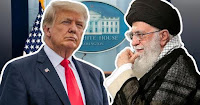Despite the severe blows, and thanks to Iran’s military,
security, diplomatic, and popular strength, Tehran has been able to show
unprecedented deterrence that have inflicted unforeseen costs on its enemies.
This has been achieved through carefully considered
operational performance that has efficiently confounded their calculations,
while maintaining its constant readiness for any potential future surprise
attack.
Tehran has avoided falling into the trap of depleting its
strategic capabilities, which will establish more solid negotiating power in
favor of the entire Axis of Resistance.
The legitimacy of the strategic vision of the Islamic
Revolution, its institutions, and its alliances (not its arms, as the enemies
promote) was strengthened, as it purified the Islamic popular consciousness and
mood, which had been polluted by Western propaganda and fabricated nonsense.
The victory of the Islamic Revolution in Iran compensated
for the setbacks suffered by the peoples of West Asia, particularly after
Egypt’s deviation from the resistance front and its subsequent normalization
with the Zionist regime.
Over four decades since the blessed Islamic revolution, Iran
has been able to shake the foundation of the illegitimate Zionist entity. Thus,
the project of David Ben-Gurion, one of the colonial Israeli entity’s founders,
has collapsed.
This imperialist project was based on forging strategic
alliances with peripheral states (Iran and Turkey) in order to restrain the
surrounding states (Syria, Lebanon, Jordan, and Egypt).
Since the 1990s, despite the heavy toll of the 1980-88
Iran-Iraq War, Tehran’s support for Hezbollah led to the May 2000 liberation,
victory in the July 2006 war, and the successive victories of Gaza from 2008 to
2021, in addition to defeating the Takfiri project in 2017.
“A million Arabs are not worth a Jewish fingernail. We must
stop the Iranian attack on Israel,” Jay Sullivan, the US senator and AIPAC
member, wrote on X, making no distinction between Iranians and the Arabs, even
though the imperialist project tried hard to present them as opposites.
What Tehran has established as a firm principle is that
accepting the so-called “peace” concessions, as proven by the experiences of
Egypt, the PLO, Jordan, and some Persian Gulf sheikhdoms, only breeds more
humiliation, submission, and degradation.
Despite the events that have followed the Al Aqsa Flood
Operation - including the ongoing attacks on Gaza and Lebanon – and the fall of
Damascus, Tehran demonstrated the cohesion and resilience of the resistance
project, which some had imagined had collapsed irretrievably.
Most importantly, Iran has demonstrated its institutional
depth, structural cohesion, and extremely solid foundation.
What our enemies dub as an Iranian “project” has been
evident to the Iranian people and the peoples of the region. It has also been
evident to the herds of colonial settlers as Tehran succeeded in undermining
the trust between them and their fragile entity that failed to provide them
with security throughout occupied Palestine.
In Lebanon, Italy took over command of UNIFIL from Spain in
the presence of the head of the committee supervising the implementation of the
ceasefire agreement, US General Michael Lenny, who attended despite the warning
from the US spy den (the embassy) in Beirut to “take strict security measures”
for fear of being targeted.
Since assuming his position, succeeding General Jasper
Jeffers, Lenny will chair a meeting of the committee (which has been suspended
since March 11) to review the implementation of UN Resolution 1701.
Given the continued Israeli occupation of tens of thousands
of meters of lands along the southern border, including the five points,
UNIFIL’s most difficult challenge is whether and how its mandate will be
renewed at the end of next August.
This is in addition to its military and civilian personnel
and equipment, the value of the general budget, and, most importantly, the
extent of its powers, which have not yet been decided. The Lebanese government
has been preoccupied with condemning the legitimate Iranian response against
the American air base in Qatar, rather than pursuing the renewal of UNIFIL’s
mandate.
Meanwhile, the Lebanese Army has arrested one of the most
prominent ISIS leaders “following a series of security surveillance and monitoring
operations”, seizing in his possession “a large quantity of weapons and
ammunition, in addition to electronic devices and equipment for manufacturing
drones.”
The Lebanese Army clarified in the statement that “the
detainee had assumed leadership of the organization in Lebanon after the arrest
of his predecessor (who was appointed as a Caliphate of Lebanon) along with a
large number of terrorists.
Impact of Iran’s legendary resilience on the Resistance
forces and people



















